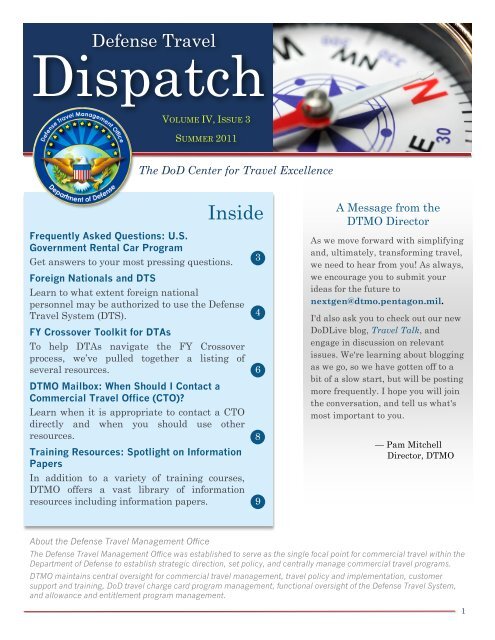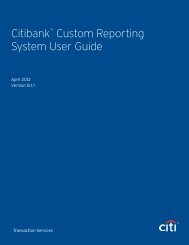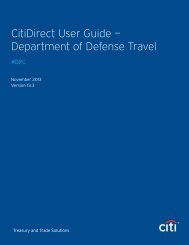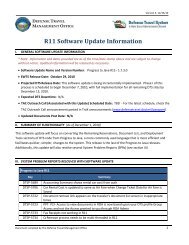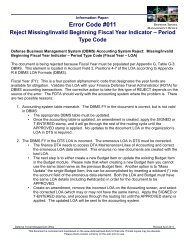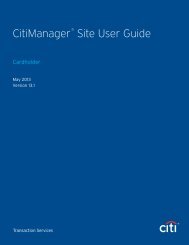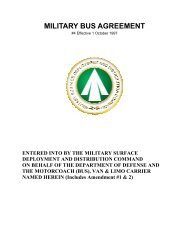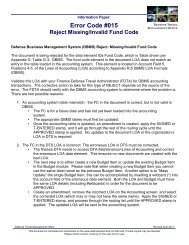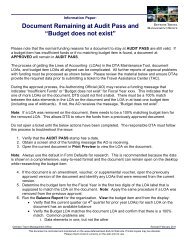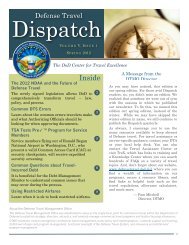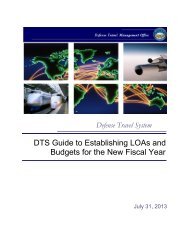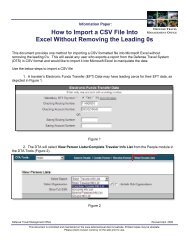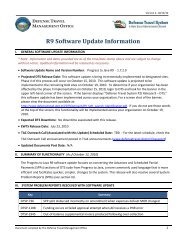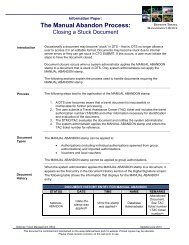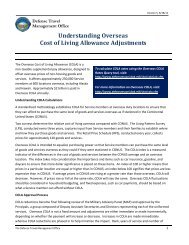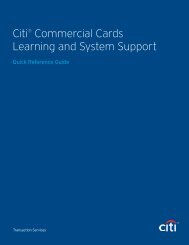Defense Travel Dispatch - Summer 2011 - DTMO
Defense Travel Dispatch - Summer 2011 - DTMO
Defense Travel Dispatch - Summer 2011 - DTMO
Create successful ePaper yourself
Turn your PDF publications into a flip-book with our unique Google optimized e-Paper software.
<strong>Defense</strong> <strong>Travel</strong><br />
<strong>Dispatch</strong><br />
VOLUME IV, ISSUE 3<br />
SUMMER <strong>2011</strong><br />
The DoD Center for <strong>Travel</strong> Excellence<br />
Frequently Asked Questions: U.S.<br />
Government Rental Car Program<br />
Get answers to your most pressing questions.<br />
Foreign Nationals and DTS<br />
Learn to what extent foreign national<br />
personnel may be authorized to use the <strong>Defense</strong><br />
<strong>Travel</strong> System (DTS).<br />
FY Crossover Toolkit for DTAs<br />
Inside<br />
To help DTAs navigate the FY Crossover<br />
process, we’ve pulled together a listing of<br />
several resources.<br />
<strong>DTMO</strong> Mailbox: When Should I Contact a<br />
Commercial <strong>Travel</strong> Office (CTO)?<br />
Learn when it is appropriate to contact a CTO<br />
directly and when you should use other<br />
resources.<br />
Training Resources: Spotlight on Information<br />
Papers<br />
In addition to a variety of training courses,<br />
<strong>DTMO</strong> offers a vast library of information<br />
resources including information papers.<br />
3<br />
4<br />
6<br />
8<br />
9<br />
A Message from the<br />
<strong>DTMO</strong> Director<br />
As we move forward with simplifying<br />
and, ultimately, transforming travel,<br />
we need to hear from you! As always,<br />
we encourage you to submit your<br />
ideas for the future to<br />
nextgen@dtmo.pentagon.mil.<br />
I'd also ask you to check out our new<br />
DoDLive blog, <strong>Travel</strong> Talk, and<br />
engage in discussion on relevant<br />
issues. We're learning about blogging<br />
as we go, so we have gotten off to a<br />
bit of a slow start, but will be posting<br />
more frequently. I hope you will join<br />
the conversation, and tell us what's<br />
most important to you.<br />
— Pam Mitchell<br />
Director, <strong>DTMO</strong><br />
About the <strong>Defense</strong> <strong>Travel</strong> Management Office<br />
The <strong>Defense</strong> <strong>Travel</strong> Management Office was established to serve as the single focal point for commercial travel within the<br />
Department of <strong>Defense</strong> to establish strategic direction, set policy, and centrally manage commercial travel programs.<br />
<strong>DTMO</strong> maintains central oversight for commercial travel management, travel policy and implementation, customer<br />
support and training, DoD travel charge card program management, functional oversight of the <strong>Defense</strong> <strong>Travel</strong> System,<br />
and allowance and entitlement program management.<br />
1
Issue 3 ! <strong>Summer</strong> <strong>2011</strong><br />
<strong>Defense</strong> <strong>Travel</strong> <strong>Dispatch</strong><br />
The U.S. General Services Administration (GSA)<br />
recently announced that it would add 435 new routes<br />
to its FY 2012 Airline City Pair Program, a 7 percent<br />
increase over last year. The program will now offer<br />
6,157 routes; 4,374 domestic and 1,783 international<br />
city pairs, the most in City Pair Program history.<br />
The City Pair Program offers government travelers<br />
on official travel as much as a 70 percent discount off<br />
comparable commercial airfares. By pairing sets of<br />
origins and destinations GSA leverages Federal<br />
Government buying power to price discounted oneway<br />
airline tickets. The agency estimates this year’s<br />
program will save taxpayers more than $7.4 billion in<br />
FY 2012, an increase of 1.1 billion over last year’s<br />
program.<br />
The 2012 renewed City Pairs contracts are effective<br />
October 1, <strong>2011</strong>, through September 30, 2012, and<br />
were awarded to 13<br />
airlines.<br />
2<br />
FY 2012 City Pair Contracts Awarded<br />
In addition to<br />
discounted<br />
airfares, the City<br />
Pair Program<br />
provides a number<br />
of benefits to<br />
federal travelers<br />
such as the<br />
flexibility to book<br />
one-way, multi-leg<br />
GSA’s<br />
City Pair<br />
Program<br />
Expands<br />
and round-trip airline flights. Additional features<br />
and benefits of this program include:<br />
• Fares priced on one-way routes, permitting<br />
agencies to plan multiple destinations<br />
• No advance purchase required or<br />
minimum/maximum length of stay required<br />
• Tickets fully refundable with no charges<br />
applied for cancellation or changes<br />
• Last seat availability<br />
• No blackout periods<br />
• Stable prices, enabling travel budgeting<br />
• Dual fare availability offering the opportunity<br />
for additional cost savings<br />
• Non-stop service—awarded in the majority of<br />
the markets where nonstop service is offered<br />
When awarding City Pair contracts to airlines,<br />
GSA considers criteria such as availability of nonstop<br />
service, average flight time, service, flight<br />
availability throughout the day, total number of<br />
flights, available seats, penalty-free cancellations,<br />
and price. GSA works with federal agencies such<br />
as DoD to understand requirements and ensure<br />
travel needs are clearly understood.<br />
For more information about the City Pair<br />
Program, visit the GSA website at<br />
www.gsa.gov/citypairs.
<strong>Defense</strong> <strong>Travel</strong> <strong>Dispatch</strong><br />
The U.S. Government Rental Car Program is open<br />
to service members and employees of the Federal<br />
Government, including the United States Postal<br />
Service, when a rental vehicle is authorized for<br />
official business travel.<br />
Why is it necessary to rent from companies<br />
participating in the U.S. Government Rental<br />
Car Program? The program provide special rental<br />
benefits and reduced rates to all federal<br />
government employees traveling on official<br />
business, such as: free collision/damage waiver or<br />
loss/damage waiver and liability insurance<br />
coverage; no charge for drivers under the age of 25;<br />
no charge for additional drivers; and additional<br />
drivers do not need to be listed on the rental<br />
contract.<br />
How do I show that I am qualified for the U.S.<br />
Government Rental Car Program when<br />
renting a vehicle? <strong>Travel</strong>ers must show<br />
authentication that they are on official travel to be<br />
eligible for the government rate by either of the<br />
following:<br />
• A travel authorization,<br />
orders or Government<br />
Charge Card (GTCC) is<br />
presented when on<br />
authorized official travel<br />
• A reservation is made<br />
through the <strong>Defense</strong><br />
<strong>Travel</strong> System (DTS)<br />
However, the GTCC and/or<br />
travel authorization/orders do not guarantee that<br />
government travelers are covered under the terms<br />
and conditions of the Agreement, unless the<br />
government rate is booked or the Government<br />
Administrative Rate Supplement (GARS) is<br />
charged.<br />
How do I know that I have a government<br />
rate? If you book your rental car through the<br />
DTS/ETS or go through your approved Commercial<br />
<strong>Travel</strong> Office (CTO), you will receive the<br />
government rate. Many of the participating rental<br />
car companies use the term “GOVT RATE” on their<br />
contracts; however, some do not. It remains your<br />
responsibility to ensure that you ask for and receive<br />
Issue 3 ! <strong>Summer</strong> <strong>2011</strong><br />
Frequently Asked<br />
Questions about<br />
the U.S. Government<br />
Rental Car Program<br />
the government rate when you pick up the vehicle.<br />
What is GARS? GARS is a daily fee (currently $5<br />
or foreign currency equivalent) and is intended to<br />
address those costs incurred by the rental company<br />
that are peculiar to doing business with the<br />
government. If you see GARS on a rental contract,<br />
you are covered under the terms and conditions of<br />
the program unless you operate the vehicle in a<br />
manner that would apply exceptions.<br />
Can I be reimbursed if I accept the optional<br />
Global Positioning System (GPS) on a rental<br />
car while on TDY? According to the Joint Federal<br />
<strong>Travel</strong> Regulations/Joint <strong>Travel</strong><br />
Regulations (JFTR/JTR),<br />
Appendix G, a GPS rental is<br />
reimbursable "when the<br />
Authorizing<br />
Official<br />
determines it is necessary for<br />
official use.”<br />
If I rent a vehicle under the<br />
program, am I always<br />
covered for accidents or<br />
damage? Normally, yes. There<br />
are exceptions listed on the U.S. Government Rental<br />
Car Agreement where your actions will exclude you<br />
from the coverage provided under the terms and<br />
conditions of the Agreement. You may find the U.S.<br />
Government Rental Car Agreement at<br />
www.defensetravel.dod.mil.<br />
Is training available that explains the U.S.<br />
Government Rental Car Program? The course<br />
"Rental Car Program" provides an overview of the<br />
program. It covers rules and tips for renting cars<br />
when traveling for DoD. It is recommended for all<br />
DoD travelers who intend to rent a vehicle. <strong>Travel</strong><br />
training resources including this course, are<br />
available through TraX.<br />
3
Issue 3 ! <strong>Summer</strong> <strong>2011</strong><br />
<strong>Defense</strong> <strong>Travel</strong> <strong>Dispatch</strong><br />
Guidelines for<br />
Foreign<br />
Nationals as<br />
DTS<br />
Administrators<br />
4<br />
<strong>DTMO</strong> receives recurring inquiries on the subject of<br />
foreign national personnel, and to what extent<br />
these personnel may be authorized to use the DTS.<br />
Like many aspects of travel, the answer is often “it<br />
depends,” in this case it is based on the Status of<br />
Forces and other local agreements between the host<br />
nation and the U.S. Government. The following<br />
information provides a synopsis of the varying<br />
categories of foreign national personnel, and in<br />
what role they may be permitted to use DTS.<br />
Governing Rules for Foreign National<br />
Personnel<br />
The provisions of a treaty, or other formal<br />
agreement normally govern the establishment or<br />
use of military bases and facilities in the territory<br />
of another nation. As referenced in DoDI 1400.25,<br />
such a treaty or agreement usually addresses the<br />
subject of employment of foreign nationals and<br />
satisfies three basic principles:<br />
1. Prevailing practices, local laws, and customs<br />
shall be followed in the employment and<br />
administration of foreign nationals when the<br />
practices, laws, and customs are not in conflict<br />
with U.S. law, applicable treaties,<br />
international agreements, or other higher level<br />
agreements, and are compatible with the basic<br />
management needs of the U.S. Forces.<br />
2. Foreign nationals shall be employed as<br />
extensively as possible by U.S. Forces.<br />
3. Provisions of the foreign national employment<br />
system in a foreign country shall apply<br />
uniformly to all elements of the U.S. Forces.<br />
Aside from these three guiding principles, Status of<br />
Forces Agreements (SOFAs) and other governing<br />
agreements differ from country to country. Thus,<br />
the business rules for usage of DTS by foreign<br />
nationals may vary from location to location<br />
depending on the host country and the governing<br />
SOFA. Therefore, in conjunction with developing<br />
business rules for OCONUS sites, it is imperative<br />
to review all agreements and to contact the official<br />
or agency of the host government designated as<br />
the point of contact for labor matters.<br />
Foreign National Personnel Performing<br />
Administrative (<strong>Defense</strong> <strong>Travel</strong><br />
Administrator (DTA)) Functions<br />
Foreign national personnel, under the immediate<br />
supervision of a U.S. citizen and with the<br />
equivalent of National Agency Check with Local<br />
Agency and Credit Check (NACLC), may act as an<br />
administrator with no Information Assurance (IA)<br />
administrative privileges in accordance with the<br />
provisions of DoDI 8500.2.<br />
Foreign Nationals Acting as Approving<br />
Officials<br />
Foreign national personnel may be eligible for<br />
appointment as a certifying officer or<br />
departmental accountable official. The local<br />
SOFAs or treaties provide that the employment of<br />
local foreign nationals is subject to the law of the<br />
host country, rather than to United States (U.S.)<br />
law. As per Office of the Secretary of <strong>Defense</strong><br />
(OSD)-Comptroller memorandum dated August<br />
22, 2006, subject: DoD Accountable Officials –<br />
Local Foreign Nationals Abroad and Contractor or<br />
Contractor Support Personnel; local foreign<br />
nationals, both direct and indirect hires,<br />
(Continued on page 5)
<strong>Defense</strong> <strong>Travel</strong> <strong>Dispatch</strong><br />
Issue 3 ! <strong>Summer</strong> <strong>2011</strong><br />
Service<br />
Members See<br />
Change in<br />
Overseas COLA<br />
This summer over 66,000 Service<br />
members stationed in Guam, Italy, and<br />
Hawaii saw an adjustment in Overseas<br />
Cost of Living Allowance (COLA). Other<br />
overseas locations with relatively small<br />
Service member populations have also<br />
seen an adjustment in COLA.<br />
An increase in COLA indicates that price<br />
differences have increased from being<br />
that much more expensive in comparison<br />
to average prices in the Continental<br />
United Sates (CONUS). A decrease in<br />
this allowance indicates that the prices of<br />
goods and services have declined in<br />
comparison. Overseas COLA is not a fixed<br />
amount and adjustments based on data<br />
are either immediate or made<br />
incrementally, depending on whether the<br />
payment will increase or decrease.<br />
Increases in COLA are made<br />
immediately, whereas COLA reductions<br />
are phased in over time to help minimize<br />
the impact of the adjustment.<br />
Service members can calculate their<br />
COLA rate at:<br />
http://www.defensetravel.dod.mil/site/cola<br />
Calc.cfm. The calculation tool is updated<br />
with the current COLA amounts each<br />
pay-period. All indexes are subject to<br />
change due to currency fluctuations.<br />
Current monthly adjustments can be<br />
found at www.defensetravel.dod.mil.<br />
(Continued from page 4)<br />
Rate Change appointed as certifying officers and departmental<br />
As of October 1, <strong>2011</strong>, the OCONUS ‘On-<br />
Base’ Incidental Expense rate will<br />
increase to $5.00 per day.<br />
accountable official[s] may not be subject to pecuniary<br />
liability under U.S. law. As a result, whether the U.S. can<br />
hold a foreign national acting as an accountable official<br />
pecuniary liable will vary from country to country depending<br />
on the applicable treaties and subsidiary agreements.<br />
Foreign National Personnel as DTS Users<br />
Foreign national personnel fall into several categories. The<br />
rules for whether they can be authorized to use DTS to<br />
travel, and under what type of authorization, vary as<br />
described below:<br />
Foreign national personnel serving as members of the U.S.<br />
military and authorized applicable travel allowances under<br />
the JFTR, may travel using DTS.<br />
Foreign national civilian personnel employed by the U.S<br />
Government and authorized travel allowances under the<br />
JTR may travel using DTS in accordance with the provisions<br />
of their governing SOFA or other applicable agreements<br />
with the host government. These personnel travel using a<br />
standard authorization (DD 1610).<br />
Foreign national civilian personnel not employed by the U.S.<br />
Government may be authorized to travel using DTS in<br />
accordance with the provisions of their governing SOFA or<br />
other applicable agreements with the host government.<br />
These personnel travel using an Invitational <strong>Travel</strong><br />
Authorization (ITA).<br />
Foreign military personnel (personnel serving in a military<br />
organization of a foreign nation) are only authorized travel<br />
under the JFTR per Chapter 7, Parts Z1 or Z2. DTS is not<br />
certified to process those types of travel scenarios; as such,<br />
foreign military personnel may not use DTS as travelers or<br />
have their travel prepared using DTS. In addition, foreign<br />
military personnel are not authorized travel under an ITA.<br />
Foreign national personnel may, based on the provisions of<br />
their governing SOFA or other applicable agreements, use<br />
DTS to create travel documents on behalf of other<br />
authorized users, to include the creation and signing of<br />
travel vouchers when authorized as Non-DTS Entry Agent<br />
(NDEA). Please refer to the DoD DTS Best Practices<br />
document at: http://www.defensetravel.dod.mil/Docs<br />
/DoD_DTS_Best_Practices.pdf and your component local<br />
DTS business rules for additional guidelines.<br />
5
Issue 3 ! <strong>Summer</strong> <strong>2011</strong><br />
<strong>Defense</strong> <strong>Travel</strong> <strong>Dispatch</strong><br />
A Fiscal Year<br />
Crossover Toolkit<br />
For DTAs<br />
1<br />
2<br />
3<br />
Tips<br />
Review chapter 8,<br />
section 8.3.4.<br />
Before rolling over lines of<br />
accounting, review the<br />
DTA Manual chapter 8,<br />
section 8.3.4 on using the<br />
Rollover LOA feature.<br />
Check for Additional<br />
Changes.<br />
Before rolling over LOA,<br />
verify with finance and<br />
budget personnel that no<br />
elements (other than fiscal<br />
year elements) will change<br />
for the next fiscal year.<br />
Check Schedule.<br />
Service/Agency business<br />
rules determine when<br />
authorizations for the next<br />
fiscal year may be<br />
generated and approved.<br />
Be sure to check the<br />
schedule first.<br />
The end of the fiscal year can be a very busy time for <strong>Defense</strong> <strong>Travel</strong><br />
Administrators. To help you navigate the FY Crossover process, we<br />
have pulled together a list of several resources.<br />
FY Crossover Training<br />
Geared toward local finance and budget DTAs, the FY Crossover<br />
course provides an overview of the fiscal year process including a<br />
review of lines of accounting (LOA) roll-over/copy functions, as well<br />
as the process for setting up associated budgets for the new fiscal<br />
year. The course is offered as on-demand web-based training or as a<br />
Distance Learning course with a “live” instructor. To access the<br />
training, visit the Training section in TraX.<br />
Upcoming Distance Learning classes: August 25 and September 15 & 27<br />
FY Crossover Guides<br />
<strong>DTMO</strong> publishes several guides to help you establish budgets and<br />
LOA, process authorizations, and prepare for the new fiscal year.<br />
(Click title to open)<br />
• DTS Guide for Establishing Lines of Accounting and Budgets for<br />
the New Fiscal Year<br />
• DTS Guide for Processing Authorizations for the New Fiscal<br />
Year<br />
* Other useful resources include the DTA Manual (see Chapter 8,<br />
Section 8.3.4) and the DTS Financial Field Procedures Guide<br />
<strong>Travel</strong> Assistance Center Outreach Calls<br />
Over the next few months, the <strong>Travel</strong> Assistance Center (TAC) will<br />
be covering the topic of FY Crossover in its bi-weekly Outreach<br />
Calls. Learn tips and get your most pressing FY Crossover<br />
questions answered. Calls are conducted every other Tuesday at<br />
8:00 am and 1:00 pm. For the upcoming schedule of topics or for<br />
information on how to participate, visit the “Announcements”<br />
section in TraX.<br />
DTS Partner System Downtime Schedule<br />
Due to the Fiscal Year Crossover and its impact on accounting activities, each accounting system has a<br />
period of unavailability. A schedule of system downtimes, as well as the next fiscal year transaction<br />
release date is available at: http://www.defensetravel.dod.mil/site/fycross.cfm.<br />
6
<strong>Defense</strong> <strong>Travel</strong> <strong>Dispatch</strong><br />
Issue 3 ! <strong>Summer</strong> <strong>2011</strong><br />
Coming to A Smart Phone<br />
Near You . . .<br />
Pay DTS<br />
Debts Online<br />
Through<br />
Pay.Gov<br />
In an effort to improve the<br />
DTS debt collection process,<br />
DFAS has added a DTS<br />
Debt Payment form to the<br />
Pay.Gov website. DTS users<br />
who are in debt to the<br />
government can now make<br />
payments online using a<br />
personal credit card, debit<br />
card, or bank account<br />
through the site. To make a<br />
payment:<br />
1. Go to www.pay.gov<br />
2. Search for “DTS Debt<br />
Notification Payment<br />
Form”<br />
3. Enter the information<br />
found on the DTS debt<br />
letter and method of<br />
payment<br />
For more information<br />
review the Guide to<br />
Managing <strong>Travel</strong> Incurred<br />
Debt DTS User Guide or<br />
visit www.pay.gov.<br />
Have you ever wanted to quickly find mileage to complete a travel<br />
document? If so, you soon will be able to use the TraX Touch app, our<br />
mobile version of <strong>Travel</strong> Explorer (TraX). With TraX Touch, users will<br />
be able to access some of the same information available in the full<br />
version of TraX right from any mobile device including iPhone,<br />
Android, Blackberry 6+, Windows Mobile 7, iPod Touch, or tablet<br />
(iPad, Android, or Playbook). Just like TraX, users can find<br />
information on airline City Pairs, view current per diem rates, location<br />
reports, mileage, and search for information using the Knowledge<br />
Center. We’ve also added a few new features such as Federal Aviation<br />
Administration (FAA) delays and alerts, flight status, and DTS/EWTS<br />
status.<br />
TraX Touch will launch early this Fall. When it is launched, additional<br />
information on the app’s features and instructions on how to access it<br />
will be posted on the <strong>DTMO</strong> website and in the “Announcements”<br />
section in TraX.<br />
7
Issue 3 ! <strong>Summer</strong> <strong>2011</strong><br />
Question: When<br />
Should I Contact<br />
a Commercial<br />
<strong>Travel</strong> Office?<br />
CTOs are contracted to support travel<br />
arrangements made both within the DTS and<br />
outside the system. The questions and answers<br />
below will assist travelers in determining when it<br />
may be necessary to call a CTO directly.<br />
Using DTS affords DoD cost reductions in terms of<br />
CTO transaction fees and voucher processing costs.<br />
When a CTO intervenes to complete a reservation<br />
for a traveler, a transaction fee may be incurred.<br />
The request assistance button in DTS offers the<br />
ability to request assistance with booking flights,<br />
hotels, and rental cars by entering travel<br />
information in the DTS record that is sent directly<br />
to the CTO. The CTO should then respond to the<br />
traveler’s request within 24 hours.<br />
When Should You Call a CTO?<br />
Emergency travel plans – When travel plans<br />
must be finalized immediately, call a CTO to make<br />
reservations. Provide the CTO with a copy of your<br />
travel authorization for ticket issuance.<br />
En route assistance – <strong>Travel</strong>ers who have begun<br />
travel and need to make a change should contact a<br />
CTO via the 24-hour toll-free number (listed on the<br />
CTO provided itinerary/invoice).<br />
Unused tickets – The traveler must notify a CTO<br />
of any unused or partially unused tickets as soon<br />
as possible. Unused tickets must be returned in the<br />
manner they were received. If you received a paper<br />
ticket from the CTO, the ticket must be returned to<br />
the CTO to process a refund.<br />
Complex multiple stop itineraries and/or<br />
remote OCONUS travel – DTS supports most<br />
multiple stop, CONUS and OCONUS travel.<br />
However, there may be times when special<br />
arrangements to remote locations are required or<br />
travel is very complex in nature. In those<br />
instances, you may contact a CTO directly or<br />
request CTO assistance through DTS.<br />
8<br />
<strong>DTMO</strong><br />
Mailbox<br />
<strong>Defense</strong> <strong>Travel</strong> <strong>Dispatch</strong><br />
Leisure in conjunction with official travel<br />
(LICWO) – Only official travel arrangements<br />
should be made in DTS. After making official<br />
reservations you may contact a CTO directly or<br />
request assistance in DTS. If using DTS, send the<br />
CTO a comment with your leisure travel<br />
destination, date(s) of travel, and your email<br />
address so the CTO can respond to your request.<br />
When Should You NOT Call a CTO?<br />
Do not call a CTO to make reservations after<br />
you already made a reservation in DTS. DTS<br />
has processed the original booking based on your<br />
reservation. If a CTO is called to make<br />
reservations, it may result in duplicate<br />
reservations and possible duplicate charges on your<br />
government travel charge card. Any time you call a<br />
CTO directly, let them know if you have already<br />
made reservations in DTS.<br />
Do not call a CTO to ask questions about how<br />
DTS works. While CTOs receive and return your<br />
travel requests through DTS, they do not have<br />
access to DTS. For assistance with questions about<br />
DTS, call your local help desk or the <strong>Travel</strong><br />
Assistance Center (TAC) at 1-888-Help-1-Go. The<br />
TAC is available 24 hours a day, seven days a<br />
week, including federal holidays. Staffed by a team<br />
of trained analysts, the TAC offers assistance on a<br />
range of travel related topics.<br />
Do not call a CTO to cancel or make changes<br />
to travel plans before departure. DTS can<br />
accommodate your initial travel request, as well as<br />
process cancellations and changes to existing<br />
reservations made prior to travel. When travel has<br />
not yet been initiated, follow the procedures for<br />
creating a DTS amendment to your authorization<br />
and then change/cancel your flight, hotel, and/or<br />
rental car arrangements, and expenses not<br />
incurred.
<strong>Defense</strong> <strong>Travel</strong> <strong>Dispatch</strong><br />
Issue 3 ! <strong>Summer</strong> <strong>2011</strong><br />
Training Resources:<br />
Spotlight on Information Papers<br />
In addition to a variety of training courses, <strong>DTMO</strong> offers a vast library of information<br />
resources. Resources are available in several formats; from short questions and answers<br />
(Q&As) to comprehensive manuals. When you need more information than what a Q&A<br />
provides and you do not have the time to wade through a manual, try using an information<br />
paper.<br />
Quick Access to Printable, Portable, and Practical Information. <strong>DTMO</strong> publishes a variety<br />
of information papers on a number of topics ranging from how to access web-based training courses to<br />
instructions on what to do about specific DTS error codes. Some papers extract individual topics from<br />
manuals and hone them into brief guides that are focused and easy to use, while others provide facts<br />
that are not so elaborate that they require a manual, but do need a more detailed explanation than what<br />
can be provided in a Q&A. Information papers are typically only a few pages in length and often contain<br />
screen shots and diagrams.<br />
Find the Right Information Paper. Access information papers<br />
through the <strong>DTMO</strong> website or through TraX using the methods below.<br />
<strong>DTMO</strong> Website: Training Resources Lookup<br />
Tool<br />
1. Go to the Training Resources Lookup Tool.<br />
2. Select Type > Reference Materials; Subtype ><br />
Information Papers.<br />
3. Refine your search by role, topic, or series, and<br />
select Submit or select Submit and scan the titles<br />
and descriptions.<br />
OPTIONAL: Use the Find feature (press Ctrl and F on<br />
your keyboard) and type in a search term. This will<br />
highlight all instances of the search term in the titles<br />
and descriptions to help you identify the resource that<br />
you need.<br />
<strong>Travel</strong> Explorer: Knowledge Center<br />
1. Log in to TraX.<br />
2. Click on Knowledge Center icon.<br />
3. Select category > DTS Reference Materials.<br />
4. Select subcategory > Information Papers.<br />
5. Enter a search term to filter the results and click Search.<br />
To see all results, leave the field blank and click Search.<br />
Popular Information<br />
Papers<br />
(Click title to open)<br />
" Budget and Audit Pass<br />
Issues<br />
" Commercial <strong>Travel</strong> Office<br />
Fee<br />
" Global Group Membership<br />
Rules<br />
" Cross Organization<br />
Funding<br />
" DFAS Check Trace<br />
Process<br />
" Dual Profiles in DTS<br />
" How to View Your Itinerary<br />
" Manual Abandon Stamp<br />
" Import/Export Multiple LOA<br />
" How to Correct EFT<br />
Returns<br />
" Report Scheduler<br />
9
Issue 3 ! <strong>Summer</strong> <strong>2011</strong><br />
Baggage policies for airlines are in a continuous state of change as<br />
airlines deal with controlling costs and managing capacity. Each airline<br />
has its own policy regarding baggage allowances and fees for government<br />
travelers and Service members. Bags that exceed the baggage allowance,<br />
both in number and size or weight, may be subject to excess baggage fees.<br />
If baggage exceeds weight and size allowances, travelers may be required<br />
to check bags through the cargo counter.<br />
<strong>Defense</strong> <strong>Travel</strong> <strong>Dispatch</strong><br />
Baggage<br />
Allowances<br />
Service members are often extended many exceptions to fees charged;<br />
however, they should adhere to size and weight allowances.<br />
According to the JTR (para. C2302) and the JTFR (para. U3015), baggage<br />
fees are reimbursable when authorized and incurred on official business.<br />
Excess baggage fees are reimbursable if the Service/Agency determines<br />
the expenses are necessary and in the government’s interest.<br />
It is recommended that travelers check an airline’s website for specific<br />
policies regarding baggage fees. If traveling on a City Pair flight, find<br />
detailed information on baggage fees on GSA’s website, www.gsa.gov.<br />
New Distance Learning Course Launched<br />
Did you know <strong>DTMO</strong> offers 27 “live<br />
instructor” distance learning classes specifically<br />
designed to support DoD travelers and travel<br />
Lorem Ipsum<br />
managers? The newest distance learning course,<br />
T-100 DTS Self-Registration and Profile, was<br />
Dolor<br />
launched in early July. This is the fourth class in<br />
the Basic <strong>Travel</strong>er series, which was created to<br />
support novice DTS users and travel managers.<br />
The 30-minute class reviews DTS account<br />
[Street Address]<br />
activation<br />
[City],<br />
and<br />
[State][Postal<br />
personal profiles.<br />
Code]<br />
Register for this, and other courses, through TraX.<br />
[Web Address]<br />
Just login and select the “Training” icon. Then,<br />
select the “View All” radio button to see all class<br />
descriptions and dates and times. Once registered,<br />
you will receive a confirmation email that contains<br />
a URL link, which will link directly to the <strong>Defense</strong><br />
Connect Online (DCO) classroom on the scheduled<br />
day/time of the class. So that you don’t forget to<br />
attend, the confirmation email also has a link to<br />
add the class to an Outlook calendar. Participants<br />
can also download certificates for any completed<br />
distance learning course through TraX.<br />
!"#$%&'(")*+*(&,*($*#&-$#."/%*&0*"(/$/1&234(#*#&&<br />
'56768&-3%49*/.&:(3%*##$/1&;&".$3/&&<br />
'567?8&-3%49*/.&:(3%*##$/1&;&@34%=*(#&&<br />
'567A8&'(")*+&
<strong>Defense</strong> <strong>Travel</strong> <strong>Dispatch</strong><br />
Keep Your<br />
DTS Profile<br />
Up-To-Date<br />
It is important for travelers to keep<br />
traveler profiles up-to-date in DTS. If<br />
this information is not accurate, travel<br />
reimbursements may be affected.<br />
When Should I Update My Profile?<br />
• New Common Access Card (CAC) is<br />
issued with a new expiration date<br />
• Government <strong>Travel</strong> Charge Card<br />
(GTCC) expires or is reissued. For<br />
reissued centrally billed account<br />
(CBA), <strong>Defense</strong> <strong>Travel</strong><br />
Administrators (DTA), should work<br />
with their local Agency Program<br />
Coordinator (APC) or CBA account<br />
manager to coordinate with their<br />
CBA-DTA to ensure that the<br />
account expiration dates are<br />
updated in the DTS CBA Module.<br />
• Change in bank account number<br />
used for electronic funds transfers<br />
(EFT)<br />
• New home address, phone number<br />
or emergency contact<br />
• Promotion or new job or change in<br />
organization location<br />
Steps to Update Your DTS Profile<br />
1. From you DTS homepage (after<br />
login), mouseover to <strong>Travel</strong>er<br />
Setup on the top menu bar and<br />
select Update Personal Profile.<br />
2. On the My Profile screen, click on<br />
each section (My Profile, My<br />
additional Information, My<br />
Preferences, My Account<br />
Information) to update<br />
information.<br />
3. To save changes, select the Update<br />
Personal Information button<br />
Issue 3 ! <strong>Summer</strong> <strong>2011</strong><br />
New Justification<br />
Required for <strong>Travel</strong><br />
A Secretary of <strong>Defense</strong><br />
memorandum, “Track Four<br />
Initiatives Decisions,” dated<br />
March 14, <strong>2011</strong>, mandates<br />
that “all DoD travel requests<br />
must include justifications<br />
that alternate means such as<br />
Secure Video Teleconference<br />
(SVTC) or other web-based<br />
communication, are not<br />
sufficiently able to accomplish<br />
travel objectives.” In response, the JFTR and JTR have been<br />
updated to comply with this mandate.<br />
JFTR, para. U4000-3b, JTR, para. C4405-b3 and Appendix I-<br />
<strong>Travel</strong> Orders, and the JFTR/JTR, Appendix E-Invitational<br />
<strong>Travel</strong> Orders, now require all DD 1610 forms and other travel<br />
order formats to include a statement justifying that alternate<br />
methods are not sufficient to accomplish travel objectives.<br />
At this time, DTS will not be configured to automatically note<br />
that an alternate method was considered. However, travelers<br />
can manually add this justification to travel authorizations<br />
based on their Service/Agency-specific guidance.<br />
About the <strong>Defense</strong> <strong>Travel</strong> <strong>Dispatch</strong><br />
The <strong>Defense</strong> <strong>Travel</strong> <strong>Dispatch</strong> is a quarterly<br />
publication issued by the <strong>Defense</strong> <strong>Travel</strong><br />
Management Office, Office of the Under Secretary of<br />
<strong>Defense</strong> (Personnel & Readiness).<br />
The reproduction of the <strong>Dispatch</strong> is permissible for<br />
official use only.<br />
To subscribe or to view previous editions, visit<br />
www.defensetravel.dod.mil<br />
Volume IV, Issue 3 – <strong>Summer</strong> <strong>2011</strong><br />
11


